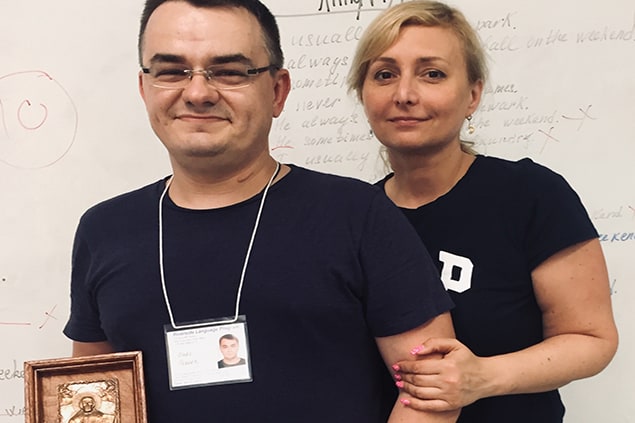Metalsmith Oleksii Porokh and his wife Anna Nefodova
Riverside Language Program, the only free, full-time English language intensive course in New York City, is currently celebrating its 40th year of operation under the new leadership of Berta Colón. Riverside’s free six-week English courses are offered in a variety of levels, held six hours a day, five days a week—enabling students to learn in under two months what usually takes a year to learn in part time programs. This intensive model is especially well suited to highly skilled immigrants, whose advanced study skills enable them to thrive in such a concentrated program, and who often languish in more traditional part-time programs.
Oleksii Porokh is one such skilled immigrant. He arrived in New York from Ukraine six months ago, where he had studied at the prestigious Kyiv Polytechnic Institute. Oleksii is from a metalsmithing family, and his studies focused on art and jewelry casting. He enrolled in Riverside in May 2019 knowing very little English but determined to put his educational experience to work.
After learning about his background, Oleksii’s teacher at Riverside connected him to the 162-year-old architectural hardware firm P.E. Guerin, the only metal foundry in the United States that still makes architectural hardware by hand, and whose clients include Gracie Mansion (the New York City mayor’s residence) and the White House. Oleksii’s English skills advanced enough at Riverside to be able to engage with the historic foundry and secure employment as a skilled metalsmith.
Oleksii is one of many success stories from the Riverside Language Program, which consistently ranks among the top 10 to 15 percent of all New York State-funded adult literacy programs. Riverside’s success is due in no small part to their high level of professionalism: All Riverside instructors hold master’s degrees and more than 10 years of teaching experience.
As a well-established program, Riverside has little need to advertise or recruit students—word of mouth alone attracts more students than they can serve. Colón shares that this is in fact Riverside’s greatest challenge: “The lack of resources for adult literacy programs is definitely a source of great frustration. With very few exceptions, foundations and corporate giving programs are just not prioritizing adult literacy in their funding portfolios. There is demand and we have the expertise. Unfortunately, we must limit our services due to limited resources.”
To that end, Riverside has gotten creative with ways to diversify their funding, including establishing an Alumni Network, holding a successful International Food Festival fundraiser, and exploring the possibility of offering a paid class in addition to their core tuition-free program.
Riverside has also turned the funding challenge into a strength. The English language program is free of charge, but Riverside recognizes that immigrant and refugee students face many other obstacles beyond just paying for tuition. Seeing the need for wrap-around support services, such as childcare and housing assistance, Riverside forged connections with other organizations and government agencies, leveraging the work already being done by these partners.
For instance, an on-site case manager/counselor works closely with skilled students who are interested in advancing their careers, connecting them with partners like B’nai Jeshurun, a local synagogue that offers resume writing, interview practice, and professional mentorship. Another stand-out partnership is with the Cooper Union Retraining Program for Immigrant Engineers. Riverside also partners with community-based organizations providing social and legal services for immigrants, asylum seekers, and refugees, such as the International Rescue Committee, CAMBA, Catholic Charities, Jewish Community Centers (JCCs), Hebrew Immigrant Aid Society (HIAS), Safe Horizon, and the Legal Aid Society. Riverside has developed a particularly fruitful partnership with Columbia University, in which Columbia students volunteer in Riverside language labs and work as interns and Riverside partners with members of Columbia’s staff on data management. Riverside was also the recipient of a grant from Columbia Community Services and selected by Columbia University’s Nonprofit Management Program as a Capstone project in 2018.
At the same time, Colón says, Riverside is planning for an even brighter future. If more funds become available, she knows just how they would be utilized.
“In terms of expansion, our priority is growing our workforce development program. We currently provide job readiness skills-building and referrals but want to broaden the set of services we offer students interested in entering the workforce.”
This would be accomplished through a combination of expanded in-house contextualized language instruction, a broader set of partnerships with field groups, and some outsourcing to consultants. For now, though, Riverside has just completed its first student lottery selection of the fiscal year and is looking forward to a whole new cohort of success stories.
A sample of Oleksii’s craftsmanship
Questions? Comments? Tell us what you think here.




